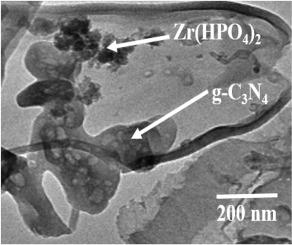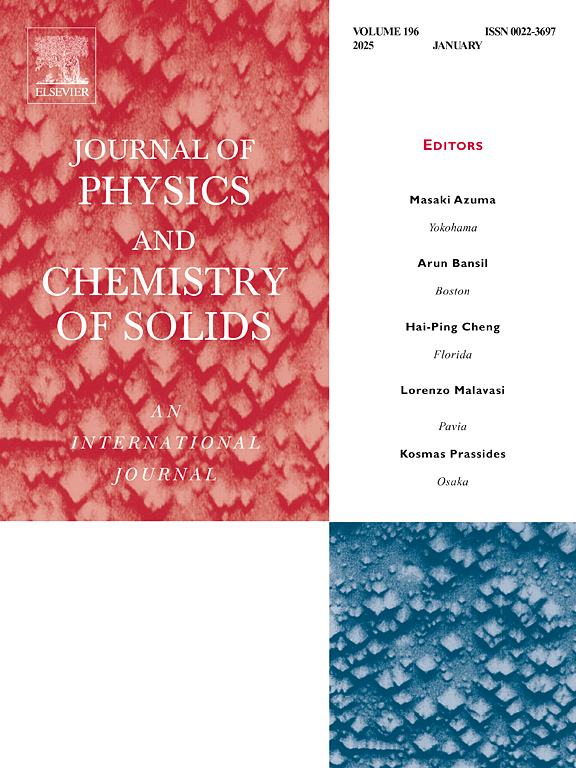声化学法制备天然太阳辐射下光催化降解罗丹明 B 的强力 S 型 Zr(HPO4)2/g-C3N4 异质结
IF 4.3
3区 材料科学
Q2 CHEMISTRY, MULTIDISCIPLINARY
引用次数: 0
摘要
通过声化学合成方法,将作为氧化型光催化剂的 Zr(HPO4)2 纳米颗粒[EVB = +3.0 eV]和作为有效还原型光催化剂的 g-C3N4 纳米片[ECB = -1.25 eV]合成了一种有效的 Zr(HPO4)2/g-C3N4 S 型异质结,用于在 1000 W 功率的天然太阳辐射下光催化降解罗丹明 B 染料。通过 X 射线衍射 [XRD]、N2-吸附-解吸等温线、漫反射光谱 [DRS]、光致发光 [PL]、扫描电子显微镜 [SEM]、X 射线光电子能谱 [XPS] 和高分辨率透射电子显微镜 [HRTEM],研究了合成异质结的物理化学性质。实验结果表明,Zr(HPO4)2 纳米粒子在 g-C3N4 片上聚集,使固体试样的比表面积从 88 m2/g 降至 21 m2/g。引入 Zr(HPO4)2 纳米粒子后,RhB 染料的光催化降解率明显提高,这表明 Zr(HPO4)2 在降低带隙能和显著提高电子-空穴分离率方面发挥了重要作用。光催化实验表明,在 g-C3N4 薄片上掺入 5 wt% 的 Zr(HPO4)2 后,在光照 3 小时内可破坏 98% 的 RhB 染料,伪一阶速率为 0.048 min-1。Zr(HPO4)2/g-C3N4异质结光催化性能的显著提高归因于成功生成了具有强大氧化还原能力的有效 S 型异质结,在降解过程中同时利用了羟基和超氧自由基,并限制了电子-空穴重组率。根据清道夫实验和对苯二甲酸聚光分析,选择 S 型途径作为光催化电荷转移的拟议机制。新合成的 Zr(HPO4)2/g-C3N4 异质结具有卓越的氧化还原能力,被认为是破坏工业废水中有机污染物的新型候选材料。本文章由计算机程序翻译,如有差异,请以英文原文为准。

Sonochemical preparation of powerful S-scheme Zr(HPO4)2/g-C3N4 heterojunction for photocatalytic degradation of rhodamine B under natural solar radiations
An effective Zr(HPO4)2/g-C3N4 S-scheme heterojunction was synthesized by sonochemical coupling of Zr(HPO4)2 nanoparticles as an oxidative photocatalyst [EVB = +3.0 eV] with g-C3N4 nanosheets as an effective reductive photocatalyst [ECB = −1.25 eV] for photocatalytic degradation of rhodamine B dye under natural solar radiation of 1000 W power. The physicochemical properties of the as-synthesized heterojunctions were investigated by X-ray diffraction [XRD], N2-adsorption-desorption isotherm, diffuse reflectance spectrum [DRS], photoluminescence [PL], scanning electron microscope [SEM], X-ray photoelectron spectroscope [XPS], and high resolution transmission electron microscope [HRTEM]. The experimental results implied the agglomeration of Zr(HPO4)2 nanoparticles on g-C3N4 sheets which reduced the specific surface area of the solid specimen from 88 to 21 m2/g. The significant increase in the photocatalytic degradation rate of RhB dye with introducing Zr(HPO4)2 nanoparticles implied that Zr(HPO4)2 plays a crucial role in reducing the band gap energy and remarkable increasing in the rate of electron-hole separation. The photocatalytic experiments implied that incorporation of 5 wt% Zr(HPO4)2 on g-C3N4 sheets destroyed 98 % of RhB dye during 3 h of light illumination with pseudo-first-order rate of 0.048 min−1. The remarkable enhancement in the photocatalytic performance of Zr(HPO4)2/g-C3N4 heterojunctions was ascribed to successful generation of an effective S-scheme heterojunction with strong redox power, utilizing of both hydroxyl and superoxide radicals in the degradation process and limiting the electron-hole recombination rate. Based on scavenger experiments and terephthalic acid PL analysis, the S-scheme pathway was chosen as the proposed mechanism for photocatalytic charge transfer. The as-synthesized Zr(HPO4)2/g-C3N4 heterojunction with exceptional redox power is considered a novel candidate for destructing organic pollutants that exist in industrial wastewater.
求助全文
通过发布文献求助,成功后即可免费获取论文全文。
去求助
来源期刊
CiteScore
7.80
自引率
2.50%
发文量
605
审稿时长
40 days
期刊介绍:
The Journal of Physics and Chemistry of Solids is a well-established international medium for publication of archival research in condensed matter and materials sciences. Areas of interest broadly include experimental and theoretical research on electronic, magnetic, spectroscopic and structural properties as well as the statistical mechanics and thermodynamics of materials. The focus is on gaining physical and chemical insight into the properties and potential applications of condensed matter systems.
Within the broad scope of the journal, beyond regular contributions, the editors have identified submissions in the following areas of physics and chemistry of solids to be of special current interest to the journal:
Low-dimensional systems
Exotic states of quantum electron matter including topological phases
Energy conversion and storage
Interfaces, nanoparticles and catalysts.

 求助内容:
求助内容: 应助结果提醒方式:
应助结果提醒方式:


